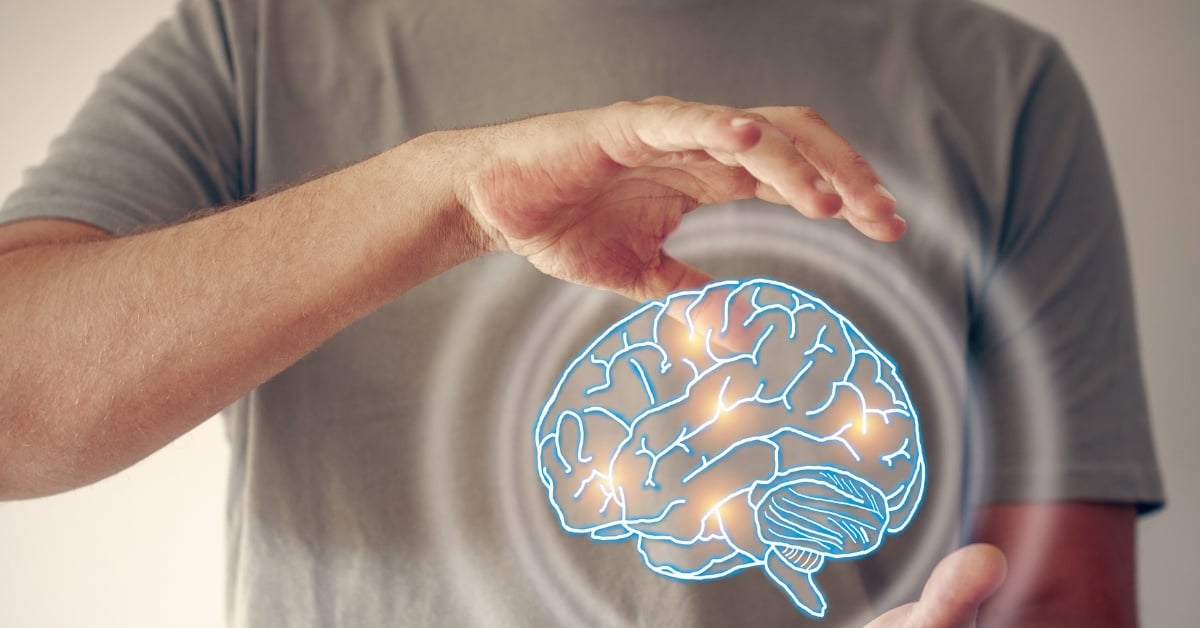Our Cognitive Capacity is Critical to Everything That We Do. Learn How This Can be Strengthened for Enhanced Performance and Improved Mental Well-Being.
The brain, it’s amazing isn’t it? It’s at the heart of everything we do.
Whether we are socializing with friends, writing an essay in the classroom, leading a project at work or completing a sudoku puzzle in our free time, our brain is the driving force behind how successful we are at the task at hand, our behaviour, and our emotions.
Within our brains are a series of networks and connections (which act like highways and stations) that work together to shape our every thought and action. These networks and specialized regions all have roles or jobs to play within specific intellectual processes, which we call our cognitive functions.
While the brain was traditionally seen as unchangeable, it has been proven through the power of neuroplasticity, that the brain can be strengthened through specifically targeted - and sustained - cognitive exercises to improve performance in all areas of our lives no matter our age.
To see these results, it’s critical to understand what cognitive functions are and how they impact learning and behaviour. With that knowledge, neuroplasticity can transform lives - something Arrowsmith has been doing for more than 40 years.
That’s why - whether you are a parent looking to help your child improve their performance and well-being, an educator looking to implement neuroeducation in your school or learning centre, a corporate leader looking to enhance your team's capabilities, or a health professional looking for better client outcomes - this beginner's guide gives you an understanding of cognitive functions and how they can be strengthened through cognitive exercises.
A cognitive function is the job of a region, or network of regions, of the brain. Simple tasks may require just a few cognitive functions (finding a can of tomatoes in the cupboard relies predominantly on our cognitive function known as object recognition as well as the executive functions of non-verbal and symbolic thinking), while other tasks rely on multiple cognitive functions working together in tandem.
Also to keep in mind: each of these cognitive functions operates across a continuum of capacity.
A cognitive function may operate at a superior level of functioning, at a severe level of challenge, or anywhere in between. The degree to which different cognitive functions operate defines one’s ability to carry out the tasks requiring those functions, and the degree to which we can learn and perform with ease and independence.
There’s value in understanding both the role of each cognitive function and the capacity at which each of these cognitive functions are operating. Think about this in terms of an orchestra, with cognitive functions being the instruments. Each instrument has a unique sound and is highly specialized, and must execute its sound according to the different types of music being played.
Like the range of capacity across cognitive functions, the degree to which instruments are well-tuned, the musicians are prepared, the orchestra well practiced - will determine the success of the music. The best trained orchestra will play effortlessfully, without errors or issues. Less trained or less prepared musicians, with one or more instruments out of tune or practice, the overall sound is less than desired. When multiple instruments are out of tune, and multiple musicians are ill-practiced, the music is disastrous.
This is the same as our brain. When our cognitive functions are operating well they influence our learning and performance in positive ways. We manage tasks with ease, with independence, we develop confidence.
At every moment, our unique brains are active, and over the course of the day, our brain is required to solve thousands of tasks. Our success at any task - planning a budget, studying for an exam, listening to a podcast, executing a play on the sports field – at any age – will be determined by the cognitive functions involved, and the capacity or level of functioning of each of them.
To be sure, we all have strengths and weaknesses. This unique combination of cognitive strengths and weaknesses make up each of our unique cognitive profiles. It is this cognitive profile that shapes our experiences in school, the workplace, and daily life. Understanding an individual’s unique patterns of gifts and challenges can be an important aspect of self discovery, and of empathy. With insight into one’s cognitive profile, teachers can develop better solutions for their students, parents can develop more patience for their children; spouses, colleagues, and neighbours can develop tolerance and even compassion for one another.
“Just as our brains shape us, so too can we shape our brains.”
Barbara Arrowsmith-Young
Not only does our cognitive profile shape our world, we can shape our cognitive profile. That is, cognitive functioning can be improved through cognitive training. Depending on one’s needs, life’s goals and ambitions, even phase of life: different cognitive functions can be targeted and enhanced.
The first step to a strong cognitive profile is understanding where one’s capacities currently sit. The next step involves the application of neuroplasticity. Learn more about this potential in future sections.
Are you interested in finding out your unique cognitive profile of strengths and weaknesses? Start your journey by taking the Arrowsmith Cognitive Questionnaire.

.jpg?width=1200&height=628&name=Cognitive%20Functions%20Blog1%20blog%20(1).jpg)
Now that cognitive function has been defined, it’s time to dive deeper into specific cognitive functions known to be essential in learning, performance, behaviour, and overall well-being.
Let’s focus on 10 key cognitive functions:
The Motor Symbol Sequencing cognitive function underlies our ability to learn and produce motor plans in writing, reading and speech, making it critical to tasks such as writing, typing, reading quickly and accurately, copying material down when writing, as well as verbal communication. A strength in this cognitive function allows the smooth flow of words from one’s mind onto the page.
You can read more on our Motor Symbol Sequencing page.
The Symbol Relations cognitive function is critical for understanding the relationship between multiple ideas or concepts. This cognitive function is important in tasks that involve reasoning, grasping concepts, comprehending what we read and hear, understanding jokes, mathematical reasoning, and understanding why things happen. Individuals with a strong Symbol Relations cognitive function often experience higher levels of academic achievement and are successful in making logical arguments to support their position.
You can read more on our Symbol Relations page.
Memory for Information and Instructions determines our ability to remember chunks of unrelated auditory information, allowing us to recall facts and sets of instructions we hear. Those with strong Memory for Information and Instructions often have high levels of general knowledge and a greater ability to retain information of all types.
You can read more on our Memory for Information and Instructions page.
Predicative Speech is a critical function when it comes to seeing how words and numbers interconnect sequentially into fluent sentences and procedures. This is an important function when it comes to language and communication, allowing us to convey our thoughts, intentions and expectations to others.Those with a strong Predicative Speech cognitive function are able to use language well to communicate.
You can read more on our Predicative Speech page.
The Broca’s Speech cognitive function shapes our ability to learn how to pronounce syllables and then integrate them into correctly pronouncing words. This is essential when it comes to learning how to read and spell, as well as for effective communication and the ability for us to express our ideas and information orally. An individual who can easily translate their thoughts into spoken language has a strength in this cognitive function.
You can read more on our Broca’s Speech Pronunciation page.
The Symbolic Thinking cognitive function provides the ability to develop and maintain plans and strategies through language, allowing us to problem solve, set goals and focus our attention on what’s needed to attain our goals. This cognitive function is crucial in our ability to execute tasks and maintain attention on the task at hand until a solution is found. Someone with a strength in this cognitive function has mental initiative and is a good strategist.
You can read more on our Symbolic Thinking page.
The Symbol Recognition cognitive function underlies our ability to visually identify and remember symbols, including letters, words and numbers. This makes it crucial for academic skill development in reading, writing and math. Symbol recognition helps us remember letter and number patterns so that when we see them again we can recall and compare these sequences to what is stored in our memory. A strength in this cognitive function is seen in those who are fluent and accurate readers.
You can read more on our Symbol Recognition page.
The Lexical Memory cognitive function gives us the ability to remember several unrelated words, helping us to store and organize a vast network of words and retrieve them quickly when needed. This is critical for language development, reading comprehension and effective communication (both written and verbal). A strong vocabulary is a sign of strength in this area.
You can read more on our Lexical Memory page.
The Non-Verbal Thinking cognitive function refers to our ability to accurately perceive and interpret non-verbal information, such as body language, hand gestures, voice tone, and facial expressions. This is highly important in our ability to read social cues, better navigate social situations and understand one’s own emotions. A good negotiator will have strength in this area.
You can read more on our Non-Verbal Thinking page.
The Quantification Sense cognitive function is important when it comes to our ability to have a sense of number and quantity. This makes strong functioning crucial for our ability to understand and manipulate numerical concepts - such as quantity, magnitude and measurement, as well as to understand numbers related to time, distance and money. An individual who is good at budgeting and time scheduling will have a strength in this cognitive function.
You can read more on our Quantification Sense page.


Every task or situation we engage in - whether social, professional or educational - involves a series of cognitive functions to work together for us to perform and navigate, and all of these functions are operating with their own degree of competency.
In fact, different people have almost infinitely different combinations of capacity across different cognitive functions, with various strengths and difficulties that shape how they interact with the world around them.
This makeup of cognitive functions is known as our unique cognitive profile, and it makes us who we are.
This cognitive profile shapes how we see ourselves, it helps us form how we see others and how others see us, and it dictates how we perform in specific situations. This cognitive profile is who we are, and is the reason behind what we do and how we feel.
Here’s how our cognitive functions impact us in a few key areas of our lives:
Education and Learning: Cognitive functions underlie both academic and social skills, helping individuals in an educational setting to develop critical life skills such as collaboration, communication and critical thinking and to acquire essential academic skills in literacy and numeracy. A strong cognitive capacity is essential to success in an academic setting, and future success long after. A students’ unique cognitive profile typically is understood as a behavioural characteristic: think of students who are labelled as responsible, diligent and capable, or lazy, unmotivated, oppositional - underlying any of these behaviours are specific cognitive functions.
Everyday Activities: We use our brains for everything we do in our lives, making strong cognitive functioning critical to everyday activities such as decision-making, learning, problem-solving, and finding our way from one location to another. Our cognitive capacity allows us to interact with our environment, communicate with those around us and complete everyday tasks with ease. Consider your network of friends, family, neighbours or colleagues. Who are the social butterflies, the loners? Who takes initiative, who lacks ambition? Who leaps into new experiences, who hesitates and hangs back? All are characteristics of their cognitive strengths and weaknesses.
Social Well-Being: Cognitive capacity is critical when it comes to our social well-being, whether it be picking up on non-verbal cues, communicating with our friends and family effectively, or understanding the relationship between other people’s stories and our emotions (empathy). This domain is typically understood as a quality of personality - a strength or quirk. Indeed, our emotional intelligence and social-emotional wellbeing is highly individualized - and is a manifestation of each person’s unique cognitive makeup.
Professional Life: Cognitive functions that are critical in the workplace include processes that enable task completion, decision making, efficient problem solving, memory retention, and attention. When we have stronger cognitive capacity, we are more productive, creative and successful in our careers. Studies suggest one’s cognitive capacity has the greatest influence over career success; it’s not because they work harder, it’s because their brains are operating optimally.
"To understand the brain is to understand oneself."
Sir Francis Crick
Molecular Biologist, Biophysicist, Neuroscientist


No two brains are the same. Our cognitive capacities and capabilities vary from function to function and from person to person, meaning we all have different views of the world, experience our daily lives differently and, as a result, we all have different ambitions and goals.
Understanding one’s own cognitive profile, as well as others - can offer heightened understanding of how we operate in our world and can contribute to empathy. It can be powerful for individuals, families and professionals to recognize and redefine one’s experiences through a cognitive lens.
Another important reason to understand the specification of one’s cognitive functioning, is to dissect and demystify struggles in learning which allow for the development of targeted solutions..
Traditionally, when individuals are challenged in learning, they receive a learning disability (or learning difficulty) label, such as ADHD, Dyslexia, Dyscalculia, Memory Retention Difficulties or Executive Functioning Difficulties, among others.
When these labels are applied, whether the individual is in school or in the workplace, conventional approaches assume these struggles are permanent, so strategies, tools or different material must be made available to the learner or employee. This typically presents as accommodations such a voice-to-text software, or modifications like lower expectations or presenting material in smaller digestible chunks or in different formats (visual vs. auditory). Think of these as ‘workarounds’, working around a weak cognitive function.
To some extent, these workarounds are helpful, even necessary if there’s no other option. However they are limited, can be expensive or unrealistic, and most importantly, they don’t address the issue so they will always be required.
There is another option to these accommodations and modifications, because the brain can be changed. Learning disabilities don’t have to be permanent, because cognitive functions can be strengthened.
Science has proven that the brain can change. The capacity of each of specific cognitive function is not a fixed state; just as someone can develop stronger muscles in the gym through targeted exercise, individuals can build stronger brains through targeted cognitive programs
Learning difficulties have been overcome through cognitive training designed to target and strengthen the specific core causes of the learning issues. Assessments can identify these specific cognitive functions, the level at which they are currently functioning, and cognitive exercises can be customized to meet the unique needs of each individual.
This approach can be applied throughout the school years and throughout our lifetime: individuals can develop cognitive reserves to address cognitive decline that occurs with the aging process. Adults can stay ahead of their professional and personal pursuits through cognitive enhancement. Students and young adults can prepare to thrive in an ever-changing world through developing essential processes such as critical thinking, problem solving, decision-making, collaboration and communication. Those who struggle with learning disabilities and those with mental health issues can transform their cognitive capacity allowing them to better access and benefit from academic and therapeutic programs. Accelerated growth in benefitting from these types of programs, once one’s cognitive profile is strong has been reported.
Across the many phases of life, understanding how different cognitive functions shape the way in which our world is experienced - and - how we can shape our cognitive functions to experience a different reality - allows for a truly evolved understanding of human potential.
"Understanding the brain is not just a scientific pursuit; it is the key to unlocking the full spectrum of human experience and potential."
V.S. Ramachandran
Director of the Center for Brain and Cognition, University of California, San Diego

.jpg?width=2000&name=ainara-oto-AOL94TAX0tU-unsplash%20(1).jpg)
.jpg?width=1200&height=628&name=READ%20THE%20BLOG%20(1).jpg)
“If a network supporting a brain function is repeatedly stimulated through practice and training, it will become stronger, contributing to the optimization of that brain function.”
Alvaro Fernandez
Sharp Brains Guide to Brain Fitness
So now that we have insight into the role of cognitive functions in our lives, have begun to explore the specific nature of these essential processes, and understand that research has demonstrated they can be strengthened, how exactly do we go about it? This is where the principles of neuroplasticity come into play.
Neuroplasticity is simply our brain’s ability to change in response to experience and stimulation over time (our brain’s plasticity).
The science of neuroplasticity explains our brain’s ability to strengthen existing connections and to form new neural connections throughout our lives in response to training and new experiences.
By leveraging our brain’s plasticity in a positive direction, cognitive functions can be strengthened, no matter where they are initially on the continuum of capacity. Whether they are under functioning or functioning adequately, enhancing these processes can lead to transformative gains. Structural, functional and behavioural improvements mean that learning and performance can be maximized, and any one can reach their fullest potential.
The power of neuroplasticity can be harnessed to enhance specific cognitive functions. When these functions are operating optimally, the entire range of their influence is heightened. This means increased performance across tasks, settings, situations, and even within our own emotional well-being.
Another important qualifier - neuroplasticity is possible throughout one’s lifetime. It is never too late to achieve a stronger cognitive capacity.
So, how does this work? Let’s take a step back to the body conditioning comment we made in the last section. Just like someone would work out in a gym to gain strength, agility, and endurance in pursuit of a healthy body, it is possible to improve our brain’s functioning through cognitive exercise. Like working out a muscle, specific brain exercises can target and enhance specific cognitive functions.
Something to keep in mind - the brain is better than a muscle. Unlike our body’s muscles that weaken or even atrophy without active training - once strengthened through cognitive exercise, our cognitive functions remain strong. Used in everyday intellectual activity, they receive their own maintenance simply by continuing to participate in the world. Every moment of learning, communicating, problem solving, socializing, and organizing - one’s now strong cognitive capacity continues to reap the benefits of the initial cognitive training.
“If a brain is exercised properly, anyone can grow intelligence, at any age, and potentially by a lot.”
Dr. Michael Merzenich
Professor Emeritus, UCSF, Kavli Laureate in Neuroscience
For more than 40 years Arrowsmith has been using the principles of neuroplasticity, to target and strengthen cognitive functions through specialized programming. From 6 to 90+, participants enhance functions essential to learning and performance, fundamentally changing the way their brains operate.
For anyone looking to enhance their experience in life, a first step might be to prioritize which exercise would give maximum benefit. Arrowsmith’s Cognitive Assessment provides individuals with in-depth insights into their unique cognitive profile and customizes a program of recommended cognitive exercises based on their personalized report. Certainly for those with learning difficulties or learning disabilities, a cognitive assessment is crucial to understand the inconsistencies of their learning experience, and to create a comprehensive solution of cognitive exercises that will address the cause of their struggles at the core.


Having an understanding of cognitive function within the educational context is valuable, and could be revolutionary.
The school years are crucial for growth and learning. Schools provide the foundational framework for acquiring knowledge, skills, and values that form the basis for lifelong learning.
Of course, educational systems are meant to impact not only academic skills, but are also expected to shape students’ social, emotional, and cognitive development. This educational experience influences the trajectory of one’s life, and shapes society as a whole. Indeed, a successful educational system breeds a successful society.
The importance of education underlies the importance of bringing a cognitive lens into the educational equation. The reason is twofold:
Conventional educational systems can be transformed using a neuroeducational approach, preparing their students with strong brains and a readiness to thrive in their future. Effective cognitive programs can provide:
In fact, research has proved that participation in such programs leads to improvements in:
Watch Arrowsmith’s Founder and Pioneer in Neuroeducation, Barbara Arrowsmith-Young, share how schools can enhance the cognitive and learning potential of all students:
Educational systems must reflect the innovations of science and technology, and must prepare students for a world that is increasingly unpredictable. By strengthening the cognitive functions of students, their academic, social and emotional well-being can be enhanced, and they can be prepared to contribute meaningfully to their own lives, and to others. A cognitive solution within the educational system does not merely improve the quality of life for students, but of their family, community, and society as a whole.
"The mind is not a vessel to be filled, but a fire to be kindled." Plutarch


Are you interested in learning how strengthening cognitive functions can help individuals first-hand? Here are some real-life success stories on how Arrowsmith’s cognitive exercises have helped individuals strengthen their brains and improve their lives.
“I’ve been involved with Arrowsmith since 2016 and it has been a fantastic journey and I look forward to many more years in this amazing program….. all students should have the opportunity to benefit from cognitive programs utilizing the principles of neuroplasticity. Programs that change the brain's capacity to learn and open to these learners a world of possibilities”
“When my son, Kareem, was four-years-old, he struggled to cope with the mainstream academic program. His first symptoms were difficulty following through on instructions and motor coordination (not able to follow gym class or stay in the queue with other children on outings). Kareem would always be out of place, or off task. The school he was attending in London at that time told us they were unable to accommodate him because the number of students in a class (24) would not allow the teacher to have the extra time required to meet his learning needs. They advised us to look for a school for ‘special kids’. Here started our long road in search of a solution.”
Watch an animated film inspired by Rita’s journey of discovery that led her to the Arrowsmith Program and ultimately the creation of Cognitive Enhancement Centre, an Arrowsmith Provider based in Geneva.
(Source: Cognitive Enhancement Centre – Geneva)
The psychometric assessments conducted post Arrowsmith Program show notable increases in Verbal Comprehension, Perceptual Reasoning and especially in Working Memory and Processing Speed compared to pre Arrowsmith Program. My students and their parents regularly see and value the constant positive changes in their child’s social and emotional development.
As a bit of backstory, my father one day was scrolling through TEDx talks and came across one from Barbara Arrowsmith-Young, "The Women Who Changed Her Brain". After watching the video, he immediately emailed her asking for more information, and that is how I was introduced to the Arrowsmith Program when I was 16 years old. Currently 23, I have completed my Bachelor's Degree in Electrical Engineering at Queen's University including a professional internship and was awarded first-class honours. I'm currently completing my Master's degree in Electrical Engineering focusing on localization of autonomous vehicles, which I should complete by early September of 2021 as part of an accelerated master's program offered at Queen's to select individuals.
“Lara's mom, Tegan, discovered the Arrowsmith Program through 60 Minutes in 2016. Lara's determination, combined with the Arrowsmith Program's neuroplasticity principles, resulted in significant improvements in Lara's cognitive abilities, including working memory and reading comprehension. Lara has made remarkable progress and is now thriving academically and socially. This heartwarming success story showcases how the Arrowsmith Program can empower individuals to reach their full potential and experience newfound joy, understanding, and emotional growth.”


